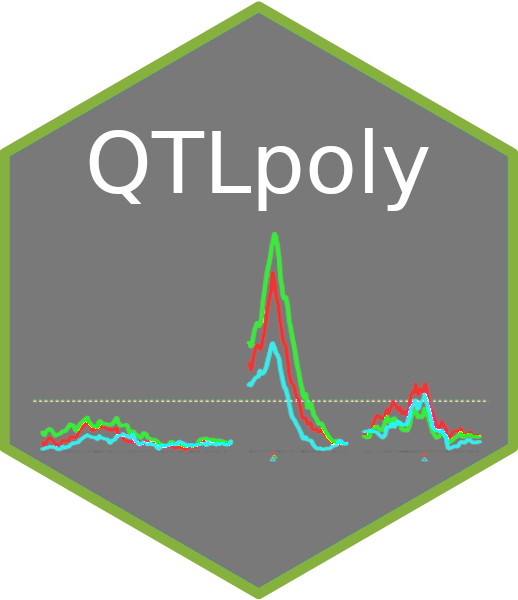The R package qtlpoly (v. 0.2.4) is an under development software to map quantitative trait loci (QTL) in full-sib families of outcrossing autopolyploid species based on a random-effect multiple QTL model (Pereira et al. 2020).
In order to do so, you will need a genetic map from which conditional probabilities of putative QTL can be computed. We recommend mappoly, a hidden Markov model-based R package to construct genetic maps in autopolyploids (Mollinari and Garcia 2019).
Variance components associated with putative QTL are tested using score statistics (Qu et al. 2013), and final models are fitted using residual maximum likelihood (REML, adapted from the R package sommer). Plots for visualizing the results are based on ggplot2 (v. 3.1 or higher) (Wickham 2016).
qtlpoly's stable version is available on the Comprehensive R Archive Network (CRAN). You can install it by running:
install.packages("qtlpoly")qtlpoly's development version is available here on Github. You can install it using the R package devtools:
install.packages("devtools")
devtools::install_github("gabrielgesteira/qtlpoly") If you are using Windows, you may need to first install the latest recommended version of Rtools.
Tutorials as well as simulated and real data set analyses will be listed here in order to help users to get familiar with the software and allow them to perform their own analyses:
- Tutorial on Multiple QTL Mapping in Autopolyploids with QTLpoly
- Tools for Polyploids training section: Multiple QTL Mapping in an Autotetraploid F1 population with QTLpoly
-
Polyverse - the polyploid R universe (a Lindsay Clark's initiative)
-
Variant Calling
-
Simulations
-
Genotype calling
- ClusterCall: Automated tetraploid genotype calling by hierarchical clustering
- fitPoly: Genotype Calling for Bi-Allelic Marker Assays
- polyRAD: Genotype Calling with Uncertainty from Sequencing Data in Polyploids and Diploids
- SuperMASSA: Graphical Bayesian inference tool for genotyping polyploids
- updog: Flexible Genotyping for Polyploids
- VCF2SM: Python script that integrates VCF files and SuperMASSA
-
Genetic mapping in polyploids
-
Haplotype reconstruction
-
QTL mapping
-
Data visualization
This package has been developed as part of the Genomic Tools for Sweetpotato Improvement (GT4SP) and SweetGAINS projects, both funded by Bill & Melinda Gates Foundation.
Covarrubias-Pazaran G. 2016. “Genome-assisted prediction of quantitative traits using the R package sommer.” PLoS ONE 11 (6): 1-15. doi:10.1371/journal.pone.0156744.
Mollinari M, Garcia AAF. 2019. “Linkage analysis and haplotype phasing in experimental autopolyploid populations with high ploidy level using hidden Markov models.” G3: Genes, Genomes, Genetics 9 (10): 3297-3314. doi:10.1534/g3.119.400378.
Pereira GS, Gemenet DC, Mollinari M, Olukolu BA, Wood JC, Mosquera V, Gruneberg WJ, Khan A, Buell CR, Yencho GC, Zeng ZB. 2020. “Multiple QTL mapping in autopolyploids: a random-effect model approach with application in a hexaploid sweetpotato full-sib population.” Genetics 215 (3): 579-595. doi:10.1534/genetics.120.303080.
Qu L, Guennel T, Marshall SL. 2013. “Linear score tests for variance components in linear mixed models and applications to genetic association studies.” Biometrics 69 (4): 883-892.
Wickham H. 2016. “ggplot2: Elegant Graphics for Data Analysis.” Springer. doi:10.1007/978-0-387-98141-3.


